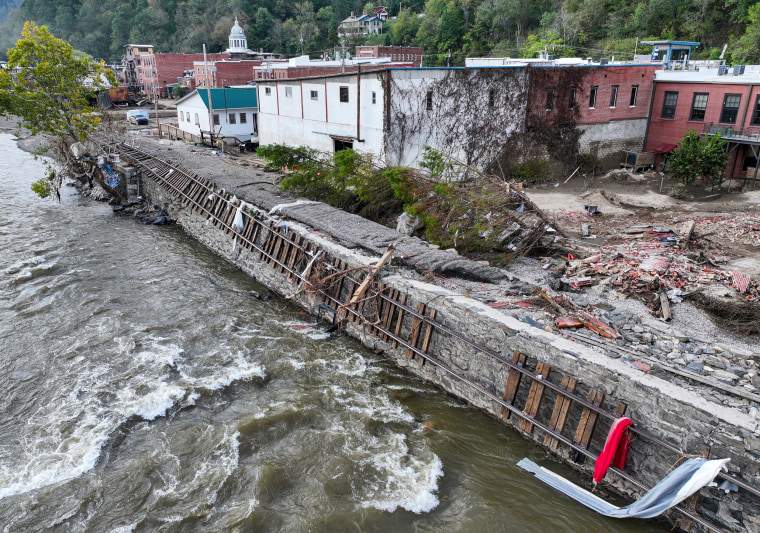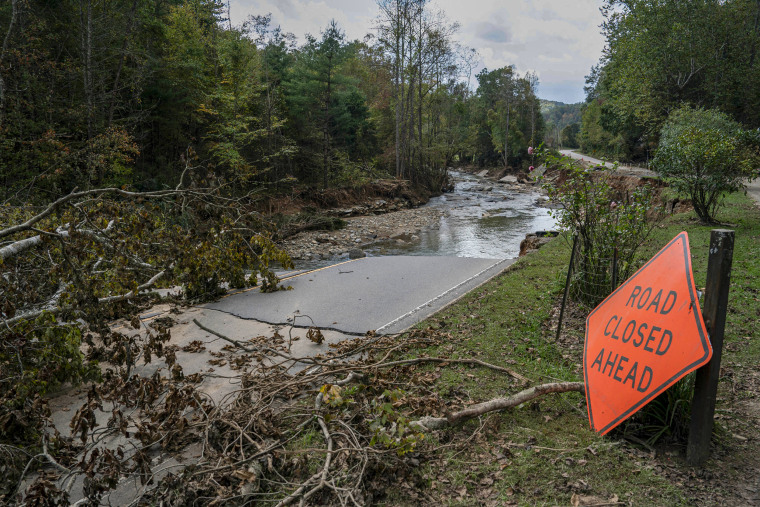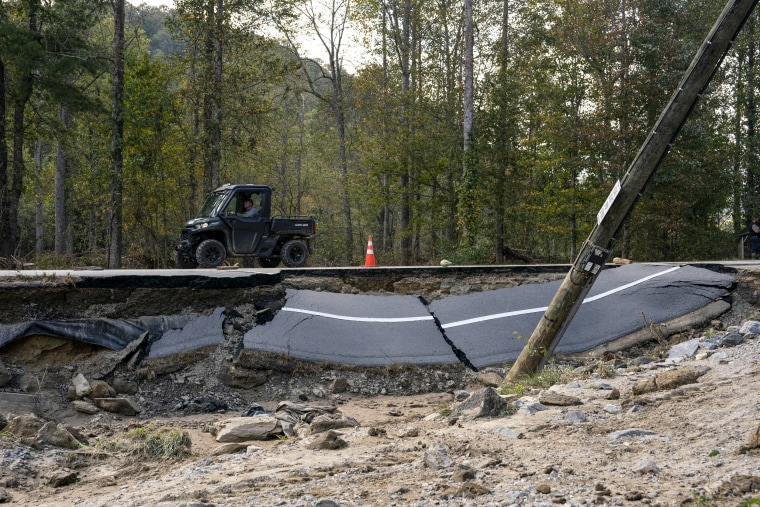BRISTOL, Tenn. — As volunteers at a high school-turned-donation center in Unicoi County, Tennessee, worked to organize emergency supplies in the aftermath of Hurricane Helene, the need for more resources was apparent Thursday.
“There isn’t anything that we don’t need right now,” said Tim Love, a volunteer at the center.
Love’s team is one of many across the region working to bring aid to the hardest-hit areas in Tennessee, coming face to face with the devastation. His team helped load Black Hawk helicopters for a delivery to a particularly damaged area in the state.
“Our county has been cut in half by this,” he said. “We’ve lost a hospital, we’ve lost life, but we’re banding together in this.”
Almost a week after the remnants of Hurricane Helene caused widespread flooding and destruction in multiple states, many survivors remain isolated and in serious need of help. The destruction of major roads, combined with the natural terrain of the southern Appalachians, have made the rapid distribution of aid an ongoing challenge.
Chris Spear, president and CEO of the American Trucking Association, told NBC News that critical throughways used for freight shipping are completely overrun with debris, cutting off in-need communities from truckers.
“These areas that are really rugged terrain are heavily dependent on roads and bridges, and as we saw from the amount of flooding that they got, a lot of that has been either washed out or completely covered with debris and mud,” Spear said.
The devastation in North Carolina and Tennessee has left two major interstates, Interstate 40 and Interstate 26, largely closed down and inaccessible. According to data from the North Carolina Department of Transportation, the entire western border of the state has limited access. Hundreds of road incidents across the region have made numerous roadways blocked and inaccessible due to the damage.

As a result, state agencies have organized air support in order to get initial supplies to survivors.
As of Oct. 2, the North Carolina Air National Guard had delivered over 100,000 pounds of food, water and other critical supplies for Hurricane Helene victims via air, according to a statement by the agency.
The supplies included 48 pallets of ready-to-eat meals and 24 pallets of water, which were flown from Charlotte-Douglas International Airport to Asheville Regional Airport on a C-17 Globemaster III. According to the statement, “the rural communities in the storm’s path have been cut off from regular supply routes due to severe damage to roads, making ground transportation nearly impossible.”
The North Carolina Air National Guard said that by using air travel, officials were able to deliver essentials to survivors in 30 minutes, whereas a land route would have taken at least seven hours.
According to their statement, “blocked roads, downed power lines, and widespread flooding hindered the relief operation, necessitating air support for rapid response.”
The roads are so damaged that Mountain Mule Packer Ranch, located about 20 miles north of Asheville, is enlisting volunteers to ride mules in order to deliver food and other supplies to families in need.
In Elk Mills, Tennessee, Becky Vines told NBC News that two bridges were washed out by Helene, leaving her town essentially cut off. She came close to tears as she watched a crew offload water, food, medical supplies and toiletries from a helicopter.
The quick drop was meant to give Elk Mills a lifeline as crews work to rebuild emergency roads where bridges went down.
“It’s amazing that they will come together like that to help this small town, this small community, everybody that’s been impacted by this flood,” Vines said. “It’s going to get better. I mean, we can only go up from here.”

Spear said that the devastation affecting not just to two-lane roads but major interstates in the area is blocking trucks from accessing communities in the Asheville area.
“North Carolina is just very, very different terrain, with service by road,” he said. “So until those roads are repaired, those bridges accessible, this is going to take a lot of time, and as a result, people are going to, they’re going to suffer.”
Robert Handfield, a professor and supply chain expert at North Carolina State University, told NBC News that the hurricane is “unprecedented” for the state.
“The storm has subsequently destroyed parts of I-40 and I-26, which are major thoroughfares for freight traffic, north, south, east, west, and you know, this is really impacting a large number of organizations in the state, not to mention all the people who have lost their homes,” Handfield said.
Handfield said it will take several weeks for the hard-hit areas to regain cell service and power, obtain all necessary medical supplies and clear their roads to allow trucks to bring goods in.
FEMA Administrator Deanne Criswell told NBC News that the first priority is still search and rescue, but closely followed by commodity delivery, then water restoration and, finally, recovery.
“We’ve been moving commodities, people, resources, into this area since before the storm hit,” Criswell said.
“We are going to continue to bring those resources in, listening to the local officials, one of the reasons I’m here is so I can see firsthand what’s needed, and people should know that we are going to be here until every person has everything they need,” she continued.
Chloe Demrovsky, executive in residence at New York University’s SPS Center for Global Affairs and a member of the FEMA National Advisory Council, told NBC News that because so much of the devastation happened hundreds of miles inland, a lot of the most damaged communities were not prepared for the storm.
She said that the circumstances in the region have left survivors with critical needs, as they’ll look to replace everything from everyday items, to rebuilding their homes and businesses, and buying new cars.
“So in a place like Florida, right, people know about hurricane season, they tend to prepare, they have a sense of how to deal with it,” Demrovsky said.

“But if you’re in an area that was impacted by massive rainfall, you’re not used to dealing with something like storm surge, you might not have prepared in the same way, by stocking up on certain things and by already having kind of prepared your property and your home for dealing with flooding,” she continued.
Handfield said that while helicopters and aircrafts are being used to carry in initial emergency supplies, air travel is not sustainable to support the recovery the area needs.
“[Helicopters] are good for sort of the essentials, but, in terms of food and water and power generators and so forth, it could take weeks for them to get power, to get cellphone service, to get, you know, roads that are passable,” Handfield said.
“This is like a marathon. It’s going to take weeks to get this region back up and running again, it’s not going to happen right away,” he added.
Morgan Chesky reported from Bristol, and Kyla Guilfoil from New York City.
